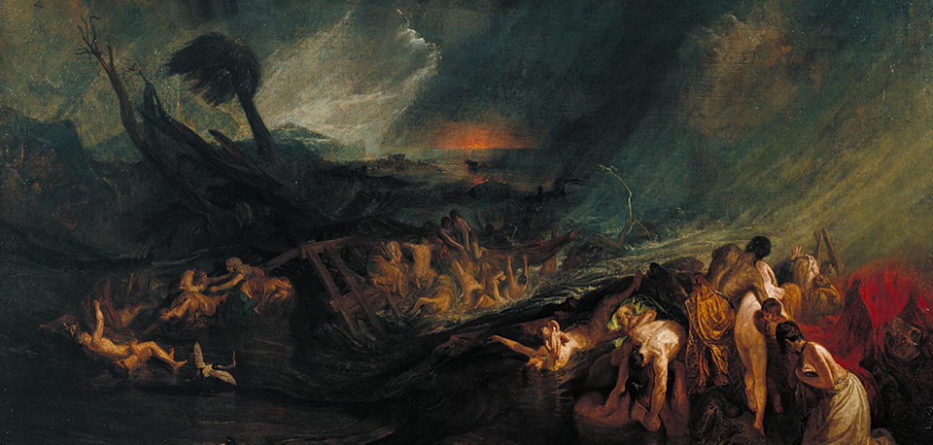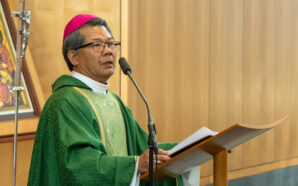Richard Dawkins wrote in The God Delusion: “The God of the Old Testament is arguably the most unpleasant character in all fiction: jealous and proud of it; a petty, unjust, unforgiving control-freak; a vindictive, bloodthirsty ethnic cleanser; a misogynistic, homophobic, racist, infanticidal, genocidal, filicidal, pestilential, megalomaniacal, sadomasochistic, capriciously malevolent bully.” Unfortunately, “the Old Testament God” is sometimes described similarly by Christians, even if they water down the language somewhat. The misperception is so widely held that it even comes up outside of religious circles, where the “Old Testament God” is used as a reference for unmitigated wrath and cruelty.
Of course, speaking of “the Old Testament God” is theologically incorrect because it presupposes a different “New Testament God,” which would make two gods. It underlies a heresy called Marcionism, which rejects the Old Testament as unscriptural because of an incorrect belief that its depiction of God is irreconcilable with how God is depicted in the New Testament. I think most people today who distinguish an Old Testament God don’t realise that this implies the existence of two gods. They are like those Origen spoke of, who, “while believing indeed that there is none greater than the Creator, in which they are right, yet believe such things about him as would not be believed of the most savage and unjust of men” (On First Principles 4.2.1).
This depiction is also wrong because it seeks to pit the two parts of the Christian Bible against each other—the Old Testament as a foil for the New Testament. Even more troubling, it comes from and reinforces antisemitic thought that wrongly equates Judaism with a false caricature of the Old Testament. This view then describes God in the Old Testament according to antisemitic stereotypes, such as being harsh and obsessed with rules. Meanwhile it also mischaracterises the New Testament and how it portrays God. In this way it seeks to show Christians as superior by highlighting God’s love and mercy in the New Testament alone.
Finally, this false caricature ignores how God is portrayed throughout much of the Old Testament (not to mention the New Testament!). There are many passages in the Old Testament that show other qualities attributed to God beyond these stereotypes. While by no means an exhaustive list, I would like to draw attention to three characteristics of God in the Old Testament that are often overlooked: he is the defender of the poor and marginalised, he is personal and intimate, and he is loving and merciful.
God is the Defender of the Poor and Marginalised
Throughout the Old Testament God warns against the mistreatment of the poor and marginalised—namely the widow, orphan, and immigrant. In the Book of Exodus, at Mount Sinai God gives the Law and states, “You shall not oppress or afflict a resident alien, for you were once aliens residing in the land of Egypt. You shall not wrong any widow or orphan” (Ex 22:20-21). A number of other similar laws are found in the Torah (Dt 14:29, 24:17, 24:19, 26:12, 27:19). In Deuteronomy, God’s justice is revealed in this particular concern for the poor and marginalised: “For the LORD, your God, is the God of gods, the Lord of lords, the great God, mighty and awesome, who has no favourites, accepts no bribes, who executes justice for the orphan and the widow, and loves the resident alien, giving them food and clothing” (Dt 10:17-18).
Although many often believe that the purpose of biblical prophecy is to predict the distant future, it is actually God’s message to the people of the day (while also revealing a timeless message), predominantly concerning two sins: idolatry and the oppression of the poor and marginalised (see, for example, Is 1:23, 10:2, Jer 5:28). In the beginning of Isaiah, God says, “Wash yourselves clean! Put away your misdeeds from before my eyes; cease doing evil; learn to do good. Make justice your aim: redress the wronged, hear the orphan’s plea, defend the widow” (Is 1:16-17). Here God commands repentance, specifically in the protection of the vulnerable. In Jeremiah as well, God defends the poor and marginalised, and in the call to repentance states,
Only if you thoroughly reform your ways and your deeds; if each of you deals justly with your neighbour; if you no longer oppress the alien, the orphan, and the widow; if you no longer shed innocent blood in this place or follow after other gods to your own harm, only then will I let you continue to dwell in this place, in the land I gave your ancestors long ago and forever. (Jer 7:5-7)
Indeed, we see that sometimes God’s wrath in the Old Testament, which people tend to view entirely negatively, is reserved for the wealthy and powerful who persist in oppressing the widow, orphan, and immigrant: “They pass over wicked deeds; justice they do not defend. By advancing the claim of the orphan or judging the cause of the poor. Shall I not punish these things?—oracle of the LORD; on a nation such as this shall I not take vengeance?” (Jer 5:28-29). Similarly, God sometimes spares the poor and marginalised from broader punishment and destruction, saying: “Leave your orphans behind, I will keep them alive; your widows, let them trust in me” (Jer 49:11).
In the Psalms, God is praised many times for his particular defence of the poor and marginalised. Psalm 68 says, “Sing to God, praise his name; exalt the rider of the clouds. Rejoice before him whose name is the LORD. Father of the fatherless, defender of widows—God in his holy abode” (vv. 5-6). God’s sovereignty is seen in and praised for this quality: “You listen, LORD, to the needs of the poor; you strengthen their heart and incline your ear. You win justice for the orphaned and oppressed; no one on earth will cause terror again” (Ps 10:17-18). In Psalm 146, we see what an important quality this is when God is praised for his care of the poor and marginalised alongside the creation of the universe and his everlasting reign:
The maker of heaven and earth, the seas and all that is in them, Who keeps faith forever, secures justice for the oppressed, who gives bread to the hungry. The LORD sets prisoners free; the LORD gives sight to the blind. The LORD raises up those who are bowed down; the LORD loves the righteous. The LORD protects the resident alien, comes to the aid of the orphan and the widow, but thwarts the way of the wicked. The LORD shall reign forever, your God, Zion, through all generations! (vv. 6-10)
God is Personal and Intimate
The creation account in Genesis 2-3 focuses especially on God’s relationship with human beings. God is there, in the dirt, forming Adam and breathing life into him. After they eat the forbidden fruit in chapter 3, God is walking about and proceeds to ask them only questions at first: “Where are you? Who told you that you were naked? Have you eaten from the tree of which I had forbidden you to eat? What is this you have done?” (vv. 9, 11, 13). The dialogue is reminiscent of a parent and child, and while it conveys frustration and conflict, it does so in a close, personal way.
In the Book of Exodus, God speaks of the liberation of the Israelites in personal and parental terms. In the calling of Moses, God states, “I have witnessed the affliction of my people in Egypt and have heard their cry against their taskmasters, so I know well what they are suffering” (Ex 3:7). Once again, God is like a father, and alerted by his child’s cry to intervene, he says, “Israel is my son, my firstborn” (Ex 4:22).
We continue to see characters in the Old Testament who are close to God in the Book of Samuel. For example, when Hannah is praying to God to have a baby, she explains to Eli, “I was only pouring out my heart to the LORD” (1 Sm 1:15), and later in the narrative God speaks to a child, her son Samuel (1 Sm 3).
Perhaps the most germane example of God’s intimate relationship with an individual is seen in the Book of Job. After God permits Job to be afflicted in order to test his faithfulness, it first states that Job does not sin or charge God with wrongdoing (1:22). Throughout the rest of the book, Job repeatedly defends himself as innocent, and charges God with afflicting him. Job’s friends insist that he must have done something wrong, noting his sad situation in life and working backwards to judge him as sinful (similar to health and wealth theology today).
In the book, Job’s children all die, his wife rejects him, and he is afflicted with sores on his body. Full of grief and physical pain, Job says to God, “I cry to you, but you do not answer me; I stand, but you take no notice. You have turned into my tormentor, and with your strong hand you attack me” (30:20-21). Job demands a trial with God and, while he does not get a trial, God does speak to him. One would expect the stereotypical wrathful God of the Old Testament to unleash fire and brimstone for this kind of talk, but instead God gives a lengthy speech to Job about himself and about the world (38-41). While the speech is not an explanation of the problem of suffering, it makes an impact on Job, who says in his reply to God, “now my eye has seen you” (42:5). Not only that, but God declares his anger against Job’s friends—those who would assume someone suffering had deserved it–and states that Job has spoken rightly of him (42:7-8). The book depicts a suffering individual angrily defending himself and challenging the dominant view of God’s justice, and God not only does not retaliate, but instead validates his experience and pain.
God is Loving and Merciful
Psalm 136 begins, “Praise the LORD, for he is good; for his mercy endures forever.” It repeats this line, “his mercy endures forever,” in each verse throughout the psalm. It’s an unfortunate misconception that the New Testament reveals God’s love and mercy in a way that contrasts with the Old Testament, and many examples can illustrate this, including this psalm.
Returning to the creation account in Genesis 2-3, God states the consequences of Adam and Eve’s disobedience—they are expelled from the garden of Eden. While this is sometimes made to sound like a devastating punishment, it says in Genesis 3:23 that God banished Adam from Eden “to till the ground,” in other words, to grow food. A few verses later it states that Eve gives birth “with the help of the Lord” (4:1). Although Adam and Eve have been cast out of Eden as a result of their disobedience, God has not cursed them (he only cursed the serpent [3:14] and the ground [3:17]). He has given them children and the means to grow food.
A more serious crime takes place in Genesis 4 when Cain murders Abel. God says that Abel’s “blood cries out” (v. 10), so one might assume God will act mercilessly against Cain in response. Instead, we see that God punishes Cain, but not to the point of death. When Cain laments that now anyone might kill him, it says “the LORD put a mark on Cain, so that no one would kill him” (v. 15). Even in his wrath, he protects Cain.
In the Book of Jonah, when God tells Jonah to preach against Nineveh, he heads in the other direction and ends up in the belly of a fish. Nineveh was the capital city of Assyria, the great empire that exiled the northern kingdom of Israel and besieged Jerusalem (2 Kgs 18). It’s no surprise that Jonah would want to avoid going to them to preach God’s judgment. When he does go to Nineveh, the people are immediately receptive to his message, fasting and wearing sackcloth. It says that “when God saw by their actions how they turned from their evil way, he repented of the evil he had threatened to do to them; he did not carry it out” (Jon 3:10). God is merciful to the inhabitants of an oppressive nation. His mercy extends even to the animals (4:11).
God’s mercy in the book of Jonah reflects how he is depicted throughout the prophetic books. When Jonah is told to preach against Nineveh because God has taken notice of their wickedness, you might think he would enjoy the chance to let them know they are the object of God’s wrath. Instead, he leaves town. Why? Because God’s warning of his impending wrath is also an act of mercy: “This is why I fled at first toward Tarshish. I knew that you are a gracious and merciful God, slow to anger, abounding in kindness, repenting of punishment” (Jon 4:2). It is merciful in itself, a second chance to repent before destruction. We see in the book that this is exactly what happens. The other prophetic books, often warning the Israelites of God’s impending wrath, are examples of God’s mercy, too. He is providing the Israelites with a chance to repent before he unleashes his anger.
A final example that shows God’s care for the vulnerable, his intimacy, and his love is Psalm 131. It reads:
LORD, my heart is not proud;
nor are my eyes haughty.
I do not busy myself with great matters,
with things too sublime for me.
Rather, I have stilled my soul,
Like a weaned child to its mother,
weaned is my soul.
Israel, hope in the LORD,
now and forever.
Although it is usually translated as “weaned,” as in the NABRE translation I have quoted, the term for the child—one who has been nursed—in this context likely means the child has just finished nursing, rather than having ceased nursing forever. The psalmist imagines his relationship to God being like that of an infant in his mother’s arms with a full belly. His faith in God is like the complete trust of an infant wholly reliant on his mother. When I think of images of God in the Old Testament, this is one of the most powerful to me.
But What about God’s Wrath?
You may be thinking, “Sure, but God is still a lot angrier and more destructive in the Old Testament than the New Testament.” My response to that is that God’s wrath is hardly missing in the New Testament. All four Gospels include Jesus’ wrath, in particular when he overturns the tables at the temple (with a whip in hand in John 2:15!). At times Jesus sounds just as fiery as the prophets: “But I tell you, if you do not repent, you will all perish as they did!” (Lk 13:3, 5). Paul writes near the beginning of Romans, the letter known as “Paul’s Gospel” (cf. Rom 16:25), “The wrath of God is indeed being revealed from heaven against every impiety and wickedness of those who suppress the truth by their wickedness” (1:18). In the next chapter he states, “By your stubbornness and impenitent heart, you are storing up wrath for yourself for the day of wrath and revelation of the just judgment of God, who will repay everyone according to his works” (2:5-6). Finally, the Book of Revelation is probably the most graphic and violent in the Bible, full of plagues, war, and natural disasters, which come as part of the great day of God’s wrath (Rev 6:17).
The coexistence of God’s love and God’s wrath may seem contradictory to us, and some of God’s actions in the Bible do lead to serious questions of morality and justice. These are important issues to wrestle and discuss. But to divide God as two beings, each found in a different part of the Christian Bible, is not only heretical, but it also contributes to antisemitic stereotypes. Instead, we should contemplate, study, and be in awe of all that the Bible reveals about God, the one who is “Merciful and gracious … slow to anger, abounding in mercy” (Ps 103:8).
Scripture texts in this essay are taken from the New American Bible, revised edition © 2010, 1991, 1986, 1970 Confraternity of Christian Doctrine, Washington, D.C. and are used by permission of the copyright owner. All Rights Reserved. No part of the New American Bible may be reproduced in any form without permission in writing from the copyright owner.
Angela Rasmussen has a Ph.D. in biblical studies. She teaches at Georgetown University and The Catholic University of America. She is married with three daughters.
With thanks to Where Peter Is and Angela Rasmussen, where this article originally appeared.









